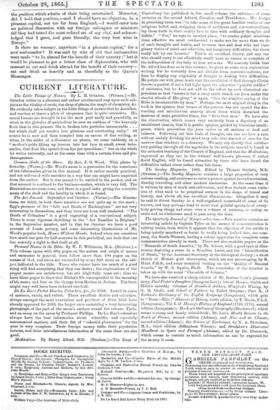Meditations. By Henry Alford, (Strahan.)—The Dean of
Canterbury has published in this small volume the substance of some sermons on the second Advent, Creation, and Providence. His design in preaching them was "to take some of the great familiar truths of our religious belief, and, stripping them of accidents and conventionalisms, lay them forth in their reality face to face with ordinary thoughts and
habits." "For," he says in another place, "to render pulpit ministra- tions effective we must condescend to make use far more than we do of such thoughts and habits, and to enter into and deal with not ima- ginary states of mind and affections, not imaginary difficulties, but those really felt by our hearers." This is an excellent theory, and any one who should carry it oat effectively would have no reason to complain of the indisposition of the laity to hear sermons. We scarcely think that Dr. Alford has done so in this volume ; he gives us some very euphonious writing, but he certainly does not abstain from conventionalisms, nor does he display any originality of thought in dealing with difficulties. He points out with great truth that the revelation of God through Christ throws a partial, if not a full light upon the otherwise "painful riddles" of existence, but he does not add to the effect by such rhetorical ex- pressions as that "nature is but a stray spark struck out from under the chariot wheels of His glory," or again, "that the simplest saying of the Bible is inexhaustible by man." Perhaps the most original thing in the book is the opinion that homes of the present day are spared the dis- tracting and mischievous anxiety about dress which disturbed the matrons of more primitive times, the "Eves that span." We have also the observation, which COMM very naturally from a dignitary of an established church, that it is public opinion, guided by Christian intelli- gence, which prescribes the flute milieu in all matters of food and raiment. Following out this train of thought, one can see how a man without unduly dividing his mind may take that amount of care for the morrow that conducts to a deanery. We may say shortly that satisfac- tory guiding through all the mysteries in the subjects treated is found in the orthodox teaching of the Church of England, and that-the Meditations, expressed as they are in the writers' well-known pleasant, if rather florid English, will be found attractive by those who have heard the difficulties talked about rather than felt them.






























 Previous page
Previous page